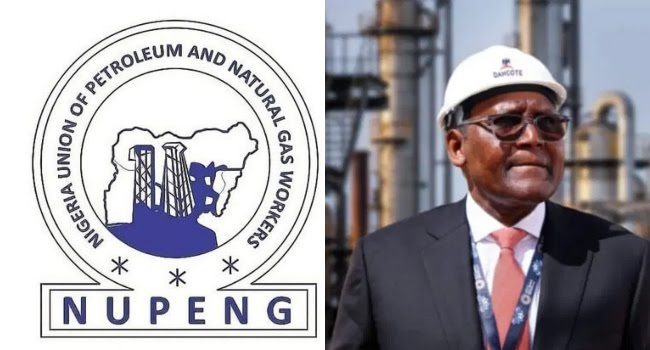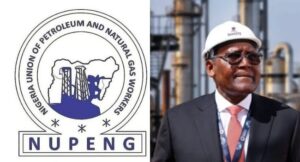
BREAKING: NUPENG Suspends Strike After Agreement With Dangote Refinery
- Nigeria News
- 09.09.2025
- No Comment
- 77
BREAKING: NUPENG Suspends Strike After Agreement With Dangote Refinery

suspended its two-day nationwide strike after a crucial meeting with representatives of the
Dangote Group in Abuja on Tuesday. This development came after growing fears of
fuel scarcity across the country following the complete shutdown of petroleum depots by tanker
drivers aligned with NUPENG.The union’s National President, Williams Akporeha, confirmed the resolution in a telephone
conversation with journalists, announcing that Dangote Refinery has agreed to unionize its drivers,
thereby addressing one of the core demands that triggered the strike action.
ban the drivers of its 4,000 trucks from joining the union. This claim sparked outrage within
the union, which views unionisation as a fundamental labour right protected under
Nigerian labour laws and International Labour Organisation conventions.

Despite an appeal from the Federal Government urging the union to shelve its industrial
action, NUPENG declared its intention to proceed with the strike. By Monday morning,
full compliance was reported across all major petroleum depots, paralyzing fuel lifting
operations nationwide.
Depots in Lagos, Warri, Delta State, and several other states witnessed parked
trucks and idle workers, while NUPENG officials actively enforced the strike directive.
In Port Harcourt, the Aradel Refinery in Obele was shut down, alongside the
Kwale Hydrocarbon facility in Delta State. Many filling stations were forced to close,
raising concerns about imminent fuel scarcity.
meeting convened by the Department of State Services (DSS). The DSS played a mediatory role,
bringing both parties NUPENG and Dangote Group together to avert what could have become a
full-blown national energy crisis.The Dangote refinery team, led by Sayyu Dantata, agreed during the meeting to
unionize its drivers. This concession paved the way for both sides to sign a
formal agreement, effectively ending the strike.
“We have suspended the strike. The Dangote refinery has agreed to unionise its drivers. We signed an agreement,”
Akporeha confirmed.
energy distribution system. With tanker drivers halting fuel loading activities,
transportation and supply chains were on the brink of disruption.

In states like Sokoto, NUPENG members shut down filling stations, closed depot gates, and
restricted tanker movements along major highways. Residents expressed shock and frustration
as transportation services faced potential fare hikes due to scarcity fears.
A tricycle operator in Sokoto, Bello Musa, lamented:
“I came out early to work and found that most filling stations were closed. If this continues,
transport fares will go up, and it will affect everybody.”
While the suspension of the strike is expected to restore normalcy, stakeholders have
warned that the fuel distribution chain remains fragile and could be disrupted again if
agreements are not fully implemented.
labour advocates as a landmark victory for workers’ rights.
NUPENG has consistently argued that workers should have the right to organize,
bargain collectively, and defend their interests without intimidation or restriction.Related News: NUPENG Tanker Drivers Announce Indefinite Strike Over CNG Trucks Dispute Tanker Drivers Threaten Nationwide Strike Over Dangote’s CNG Truck Scheme Dangote Truck Accident in Edo: Man Loses Brother Days After Defending Truck Circulation
The issue of unionisation in Nigeria’s oil and gas sector has long been contentious.
Several companies have resisted worker unionisation, citing concerns about productivity
and operational flexibility. However, labour leaders maintain that
unionised workers are better protected, safer, and more motivated.
By conceding to NUPENG’s demands, Dangote Refinery not only avoided a prolonged strike but
also set a precedent for other oil and gas companies in Nigeria.
Ministry of Labour and Employment confirming that the agreement will be closely monitored
to ensure compliance. Industry experts say the quick resolution prevented what could have
been nationwide fuel shortages and severe economic disruption.

Energy analyst Dr. Chinedu Eke observed:
“This resolution is a win-win. It reinforces labour rights while ensuring that Nigerians
do not suffer unnecessarily from fuel scarcity. However, government agencies must remain
vigilant to avoid a recurrence.”
resume immediately across depots and filling stations nationwide.
However, Nigerians may experience temporary shortages as supply chains gradually
stabilize after two days of disruption.The bigger question lies in the future relationship between NUPENG and Dangote Refinery.
While the signed agreement is a step forward, full implementation and ongoing dialogue will
be crucial to prevent future disputes.
For everyday Nigerians, this resolution provides relief from the anxiety of another
prolonged fuel scarcity crisis, which often triggers inflation in transport costs, food
prices, and other essentials.
drivers highlights the power of dialogue and negotiation in resolving labour disputes.
While the strike disrupted petroleum supply chains briefly, it ultimately reinforced
the importance of protecting workers’ rights within Nigeria’s oil and gas industry.For the government, labour unions, and private sector players, this episode serves as
a reminder that proactive engagement is key to maintaining industrial peace. For Nigerians,
it offers short-term relief but also a warning of how fragile the nation’s energy
supply system remains.




